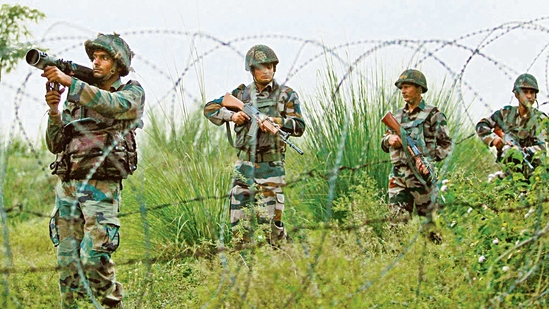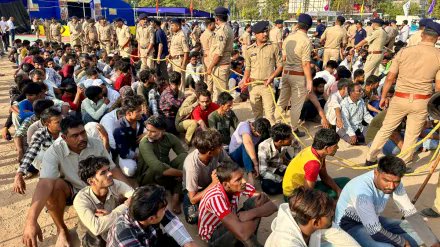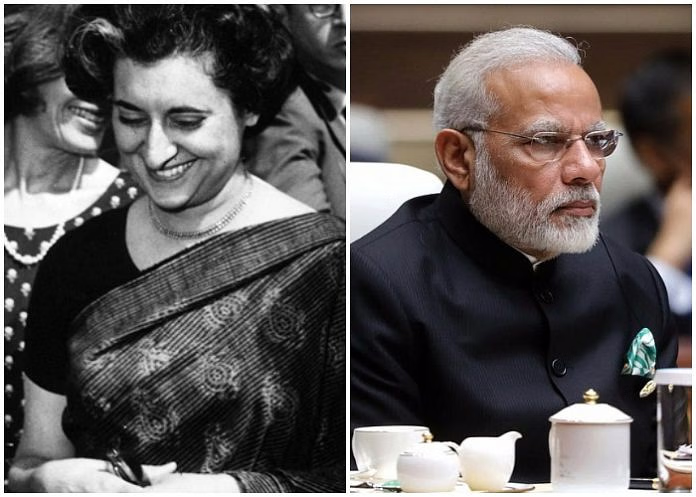Pakistan breaches ceasefire once more; Indian forces respond with swift and measured action.
On Wednesday, the Indian Army delivered a strong response to continued ceasefire violations by Pakistan.
Following the brutal terror attack in Pahalgam, tensions between India and Pakistan escalated further as Pakistan continued its ceasefire violations along the border. In a firm and decisive move, the Indian Army on Wednesday responded with precision and strength, reaffirming its commitment to national security and deterrence against cross-border aggression.
On the night of April 29–30, 2025, Pakistani Army posts initiated unprovoked small-arms fire across the Line of Control, targeting the Naushera, Sunderbani, and Akhnoor sectors in Jammu & Kashmir. In response, Indian Army troops acted swiftly and in proportion, according to an official statement from the Army.
Ceasefire Violations by Pakistan Surge Amid Rising Tensions Post-Pahalgam Attack
Jammu & Kashmir, April 30, 2025 — Tensions between India and Pakistan have sharply escalated along the Line of Control (LoC), days after a devastating terror attack in Pahalgam claimed 26 lives and injured several others on April 22.
In the wake of the attack, Pakistan has intensified ceasefire violations across multiple sectors along the LoC, including Naushera, Sunderbani, and Akhnoor in the Union Territory of Jammu & Kashmir. According to an official statement from the Indian Army, Pakistani posts initiated unprovoked small-arms fire during the night of April 29–30. Indian forces responded swiftly and proportionately, reaffirming their readiness to defend against cross-border aggression.
“The Indian Army remains fully alert and committed to maintaining peace along the LoC, while responding decisively to any provocations,” the statement added.
The ongoing hostilities have further strained already fraught relations between the two nuclear-armed neighbors. In a statement reported by PTI, Pakistan claimed to have “credible intelligence” suggesting that India may be planning a military strike within the next 24 to 36 hours.
Adding to the rhetoric, Pakistan’s Information Minister, Attaullah Tarar, accused the Indian government of preparing for military action based on “baseless and concocted allegations” regarding Pakistan’s alleged involvement in the Pahalgam terror incident.
India has not officially responded to Pakistan’s claims but has consistently maintained that it holds the right to respond firmly to any acts of terrorism or ceasefire violations that threaten national security.
The situation remains tense along the border, with defense sources indicating heightened alertness and increased troop readiness on both sides.
On Tuesday, Prime Minister Narendra Modi, in a high-level meeting with senior defence officials, asserted that the armed forces have been granted “complete operational freedom” to determine the timing, targets, and method of India’s response to the Pahalgam terror attack.
The brutal assault, which stands as one of the deadliest on civilians in the region in recent years, has triggered nationwide outrage and a widespread call for decisive retaliatory action against those responsible and their backers across the border.
In the wake of the recent attack, the Government of India has acted with urgency and determination, taking bold measures to intensify diplomatic and strategic pressure on Pakistan. Among the most consequential of these actions is the suspension of key provisions of the Indus Waters Treaty—a historic and foundational agreement between the two countries. This move carries profound diplomatic weight, signaling India’s intent to isolate Islamabad on the international stage and underline the seriousness of its concerns.
Earlier on Tuesday, Union Home Secretary Govind Mohan convened a high-level security review meeting to address the rapidly evolving national security landscape. This crucial gathering brought together the top leadership of the country’s three central paramilitary forces, as well as senior representatives from two of India’s foremost national security agencies. The objective of the meeting was to conduct a comprehensive assessment of the current threat scenario and to strategize a coordinated and effective national response to the unfolding crisis.



